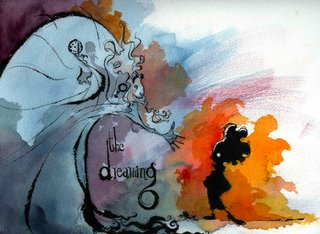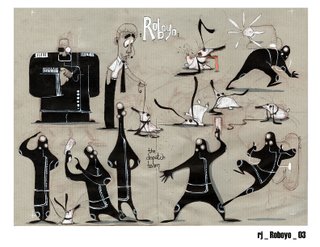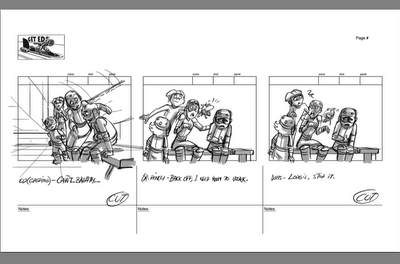 Max in the dreaming.
Max in the dreaming.
Some good news. While building a business you make friends with your clients and hopefully they will come back because of the quality of your work. One of our clients that continue to support us is Nelvana. We are storyboarding on a new show called Grossology. Thanks to Judy Leung and Matt Ferguson. While I'm on the topic I like to thank Brad Booker from Reel FX and Andy Knight from Red Rover. We have also just completed the boards for a music video for Billie Mintz.
 From The Dreaming.This is a question from a visitor, Stefano Di Lollo, that is worth sharing.
From The Dreaming.This is a question from a visitor, Stefano Di Lollo, that is worth sharing.
Dear HoC, I've been following your blog for quite some time now. From what I can see from your website, it looks like you have a great team of talent, and a great work environment to inspire creativity. Your list of clients and portfolio is impressive. I've read about the hard times that your studio is experiencing at the moment on your blog. Now, I know you have plenty on your mind right now, and the last thing you probably need or have time to read is someone giving you their 2 cents. But, since I can't ever keep my opinion to myself---I'll type the rest anyways. >>> I was just wondering the following: Is it a good idea to publicly report your studio's current problems on your blog? Clients (existing ones and potential ones) have easy access to this info, and may get scared off by the studio's instability. Just some food for thought. Good luck, I wish you guys all the best. I'd love to work with a team such as yours.
And my answer. Hi Stefano,
I'm glad that you like our work. We try hard to define ourselves in an industry full of mediocrity.
Your question is a very good one and I have put much thought into it. A similar question that I often get asked is 'am I not afraid of people stealing your development ideas'? My answer to these questions may be irrational but it is a the core of how I run my studio. We are always willing to let our pants down. We feel that the transparency of our studio endears people to want to work with us as clients and employees. Sometimes that openness is positive and sometime negative but what is important is that the creative spirit does not flourish well under secrecy. This may be the downfall of HoC but if I want the studio to reflect my values instead of being a money making entity It has to be this way.
-Ricardo
 This is from Roboyo.The only good thing about hard times is that it can't last forever. Over the last couple of weeks the studio has hit rock bottom. We lost most of our contracts
This is from Roboyo.The only good thing about hard times is that it can't last forever. Over the last couple of weeks the studio has hit rock bottom. We lost most of our contracts,
had to layoff most of our talent, the bank account is almost completely drained and the tax man is knocking. I had to question myself on the viability of this studio. Fortunately my cousin, a successful businessman, assured me that if people are calling you to do work then you ARE a viable business. I re-examined the business and though there is some restucturing that must be done I can see a clearer direction for us. With a little luck and no more major hickups we should be fine.
 In The Dreaming the preferred means of transportation is scarab beetle.
In The Dreaming the preferred means of transportation is scarab beetle.
In running a small studio the bills have to be paid. This is done by taking on service work which means doing work for other studios. Sometimes the work is fun but it is often tedious. If you do enough service work, a studio can make a lot of money especially if it is a large feature project. It is also lucrative to do commercials if your studio can handle the hectic pace of advertising. The problem is that if a studio is to grow over the long term they need to own their ideas. But how do you develop properties while your busy trying to make money to keep the studio a float? It's tough but if you keep in mind what the goal is, spending the extra time and cash to produce original content doesn't seem to hurt as much.







